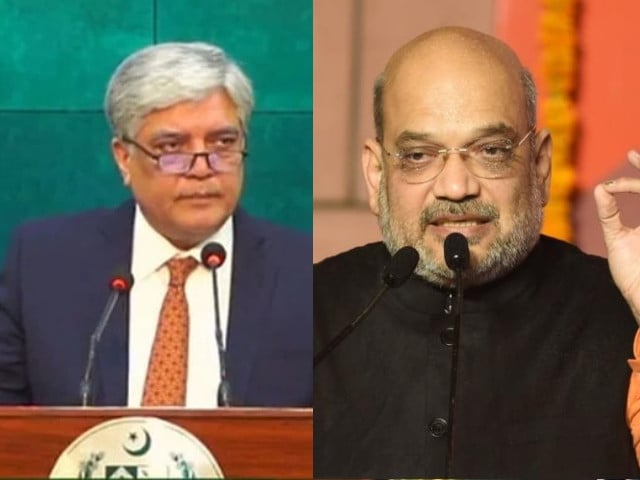Pakistan on Saturday strongly condemned Indian Home Minister Amit Shah’s remarks that the Indus Waters Treaty (IWT) with Pakistan “will never be restored,” terming the statement a “brazen disregard for the sanctity of international agreements.”
Responding to media queries regarding Shah’s interview with The Times of India, in which he said that India would divert water flowing to Pakistan for domestic use, the Foreign Office in Islamabad said the comments constitute a clear violation of international law, the Treaty’s provisions, and the fundamental principles governing inter-state relations.
“The Indus Waters Treaty is not a political arrangement, but an international treaty with no provision for unilateral action,” the Foreign Office spokesperson said. “India’s illegal announcement to hold the Treaty in abeyance constitutes a clear violation of international law, the provisions of the Treaty itself, and the fundamental principles governing inter-state relations.”
Read More: India rules out restoring Indus Waters Treaty, vows to divert water from Pakistan
The spokesperson added that such conduct “sets a reckless and dangerous precedent” that undermines the credibility of international agreements and raises serious concerns about India’s reliability as a treaty partner.
“Weaponizing water for political ends is irresponsible and contrary to established norms of responsible state behavior,” the statement said, calling on New Delhi to immediately rescind its unilateral position and resume full implementation of the treaty.
For its part, Pakistan reiterated its firm commitment to the Indus Waters Treaty and pledged to take all necessary measures to protect its legitimate rights under the agreement.
Statement by the Spokesperson Regarding Indian Home Minister’s Assertion that the Indus Waters Treaty Will Never be Restored.
Responding to media queries regarding the Indian Home Minister’s assertion that the Indus Waters Treaty will never be restored , the Spokesperson of the… pic.twitter.com/ndY9LfAkhk
— Ministry of Foreign Affairs – Pakistan (@ForeignOfficePk) June 21, 2025
Signed in 1960 with the World Bank as a guarantor, the Indus Waters Treaty governs the allocation and use of water from the Indus river system between the two countries.
The treaty guarantees Pakistan access to the three western rivers — Indus, Jhelum, and Chenab — which are crucial for irrigation and agriculture in the country. Despite wars and ongoing tensions, the treaty had largely withstood bilateral hostilities for over six decades.
However, in April 2025, India announced it was placing the treaty “in abeyance” following a deadly attack in Indian Illegally Occupied Jammu & Kashmir (IIOJK), which it blamed on elements allegedly linked to Pakistan, without providing any evidence. Islamabad has categorically denied any involvement in the incident.
Also Read: Ready to forestall India’s IWT threat: PM
In Saturday’s interview, Shah said unequivocally: “No, it will never be restored. We will take water that was flowing to Pakistan to Rajasthan by constructing a canal. Pakistan will be starved of water that it has been getting unjustifiably.”
Shah’s remarks, seen as a hardening of India’s stance, have dimmed hopes of any near-term dialogue over the future of the treaty. Reuters recently reported that India plans to dramatically increase the water it diverts from rivers that flow into Pakistan as part of what it calls retaliatory measures.
Pakistan is reportedly exploring legal avenues to challenge India’s move under international law, and diplomatic efforts are ongoing to rally international support for the preservation and enforcement of the treaty.
The escalating rhetoric over water comes amid fragile ties between the nuclear-armed neighbours, despite a ceasefire agreement earlier this year after one of the most serious flare-ups along the Line of Control in recent decades.
What is the Indus Waters Treaty?
The origins of the IWT can be traced back to the Partition of British India in August 1947, when India and Pakistan became two independent nations. Both countries, now home to over 1.6 billion people, have historically relied heavily on the rivers flowing from the Himalayas for irrigation and agriculture.
The division of the Punjab province, which was extensively developed under British rule with an integrated irrigation system, created an immediate need for an agreement on the equitable sharing of the river waters between India and Pakistan.
This was essential to prevent any future conflicts over this vital resource, particularly given that the new border separated the territories through which these rivers flowed.
After nine years of negotiations, facilitated by the World Bank, the IWT was signed in September 1960 by then-Indian PM Jawaharlal Nehru and former Pakistani president Ayub Khan.
Read More: India’s unilateral suspension of IWT could destabilise regional peace: Bilawal
India was given control over the three eastern rivers—Ravi, Sutlej, and Beas—while Pakistan was assigned control over the three western rivers—Indus, Jhelum, and Chenab. As part of the treaty, India is required to allow the waters of the western rivers to flow into Pakistan, with only a few exceptions.
The treaty also allows India to develop hydroelectric projects on the western rivers, but these projects must adhere to strict conditions.
They must be “run-of-the-river” projects, meaning that they cannot significantly alter the flow or storage of water, ensuring that Pakistan’s water rights as the downstream riparian country are not adversely affected.

